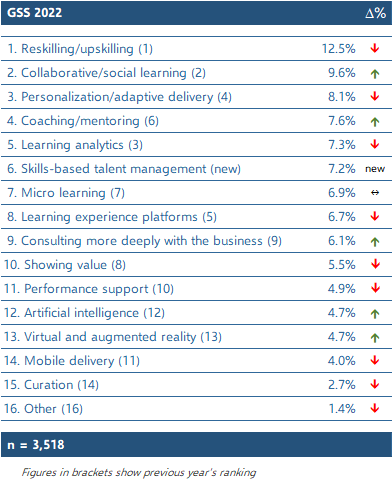L&D Global Sentiment Survey 2022: initial response
The results are out for the L&D Global Sentiment Survey 2022. They show how Covid-19 continues to affect Learning and Development (L&D) world-wide, both giving L&D departments clear goals to aim for, and making it difficult to achieve them.
The results from the L&D Global Sentiment Survey 2022 are out along with an initial response from the publisher Donald H Taylor.
1. Reskilling/upskilling no longer quite dominates
The vote is down 0.5% on last year, and failed to make the #1 slot in a number of key countries.
2. Soft trumps hard … or does it?
The main risers this year were all non-technical options, such as Collaborative/social learning (#2), Coaching/mentoring (#4) and Consulting more deeply with the business (#9). But the rises weren't huge. I don't see this as a major trend.
This year's new option, Skills-based talent management, came in at #6 with a solid share of 7.2% of the vote. This is definitely one to watch for the future.
3. Geography matters
The table shows an aggregate view of 3,500 world-wide. But local variations matter. New Zealanders are apparently wedded to Micro learning, Australians to Showing value and Swedes to Collaborative/social learning. This global view is fascinating, but let's also celebrate how very different we are.
4. The pandemic’s long shadow
Most important for me this year were the free text answers to the question 'What is your biggest L&D challenge in 2022?’ Categorising the answers, I found they mostly fell into five buckets:
- Learner engagement
- Going or staying hybrid
- Stakeholder enthusiasm / showing value
- Technology
- L&D budget and resources
The bottom three are perennial, but the first two are the result of the pandemic - employees are reportedly exhausted, overworked and difficult to engage, and many organisations are unsure how to move forward with a mixed approach to training delivery.
For more on all this, please visit the L&D GSS 2022 webpage.
Conclusion
The pandemic has left organisations demanding a lot of L&D, particularly in major re-training programmes, but it's questionable whether these organisations are supplying the support needed to meet those challenges. If organisations want to treat skills as the currency of the business (the idea that will dominate L&D for the next few years) there will need to be changes made by both L&D practitioners and the organisations they work for.
#learninganddevelopment #GSS22 #research


